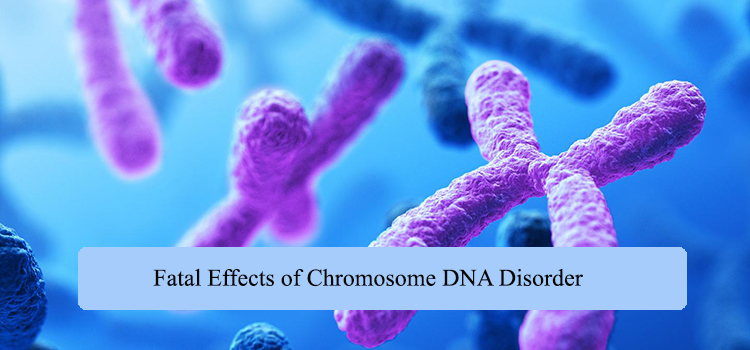Fatal Effects of Chromosome DNA Disorder

Chromosome
Chromosomes are a group of tightly packed DNAs that are located inside the nucleus of each cell in the body of a living being. Humans are born with 23 pairs of chromosomes inside them. A bundle of a chromosome is called karyotype that can be viewed or examined using a microscope. Any deviation in the standard structure or functionality of a karyotype can result in causing a chromosome abnormality.
Majority of chromosome abnormalities can be considered unharmful, but some of them are fatal and can cause issues in conceiving or maintaining a pregnancy. Even if patients suffering from chromosomal abnormality are able to give birth, there is a high chance that baby will have same disorders or worse that can cause mental and psychical disabilities in the baby.
Chromosomal Abnormalities
A chromosomal abnormality occurs when there is a dysfunction in the structure or the pairing of the chromosome DNA. A chromosomal disorder is a condition in which there is a missing, additional or an irregular portion of chromosome in the DNA.
Types of Chromosomal Abnormalities
Numerical Abnormalities aka Aneuploidy
Abnormalities caused because of the absence or presence of an extra chromosome in the pair of two chromosomes is categorized as numerical abnormalities. It can affect other genes creating some serious health conditions. Numerical Abnormalities are primarily caused because of the abnormal amount of chromosomes present in a pair.
Some numerical abnormalities can support the development of term, either because of the (small) size of the chromosome and/or due to the presence relatively fewer genes or because chromosomes have a natural mechanism to help the DNA in adjusting the gene dosage. It is further divided into two types:
Monosomy – occurs when a chromosome is missing from the pair in an individual. Example – Turner Syndrome ( is a condition in which the patient is born with only a single sex chromosome)
Trisomy/ Tetrasomy – occurs when an individual has more than two or the standard number of chromosomes in a pair. Example – Down Syndrome (in this condition the patient develops one extra chromosome 21)
Structural Abnormalities
Chromosomal disorders in which the structure of the chromosome is altered are categorized as structural abnormalities. This can cause because of deletion, duplication, or translocation of the chromosome.
Balanced VS Unbalanced Structural Disorders
They are a result of breakage or incorrect reconstruction of chromosomal segments. Structural rearrangements can be defined as balanced when the complete chromosomal bundle still exists, though it might have been rearranged, and unbalanced when the information is missing or present is present in excess. Unbalanced rearrangements occur because of duplications, deletion or insertions of the chromosome. Ring chromosomes occur when the chromosome experiences two breaks or its broken ends are fused forming a circular chromosome. An isochromosome abnormality occurs when the arm of the chromosome in a pair goes missing, and the existing arm gets duplicated.
How do Chromosomal Diseases occur?
The chromosomal disorder occurs due to an error in the cell division that results in the development of either too many or too few chromosome copies. Most of these abnormalities are born from the gametes (egg and sperm). Any disorders that develop from the gamete produce cells with the same defect. This is a result of meiotic nondisjunction. Maternal age, drug overuse, and environmental conditions can increase the risk of developing chromosome abnormalities.
FAQs
Are Chromosomal Abnormalities Diseases treatable?
Chromosomal abnormalities do not have a permanent treatment, but their symptoms can surely be reduced with medications.
Do Chromosomal Abnormalities Diseases have any fatal effects?
While most Chromosomal Abnormalities are unharmful and some of them can cause miscarriages or can be inherited by the baby who is born with health problems.
Can Chromosomal Abnormalities be inherited?
Yes, Chromosomal Abnormalities Diseases are inherited by the children from their parents which might affect the growth and normal psychology of the baby.
Can a person with the Chromosomal disorder with recurring miscarriage have a baby?
Patient suffering from this condition can use IVF treatment to ensure that the quality of egg and sperm is up to the mark. We would also recommend them to monitor the baby throughout the pregnancy to increase their chances of remaining pregnant.
Explore Medmonks.com to learn more about Chromosomal Abnormalities Diseases and its treatment options available in India.
References
https://www.yourgenome.org/facts/what-is-a-chromosome-disorder





